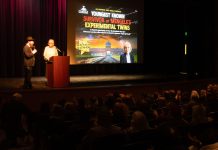GILROY
– Michigan motorcycle collector Bill Melvin, who expressed
excitement a month ago to restart production of Indian bikes, said
Monday he has changed his mind and is no longer interested in
buying
”
America’s first motorcycle.
”
GILROY – Michigan motorcycle collector Bill Melvin, who expressed excitement a month ago to restart production of Indian bikes, said Monday he has changed his mind and is no longer interested in buying “America’s first motorcycle.”
“I’ve, at this point, given up any extensive effort to go forward with that,” Melvin said. “Considering the amount of time that has lapsed, our interest has chilled.”
Melvin added that Gilroy resident Rey Sotelo told him a week ago that he, too, has more or less given up on buying the Indian brand. Neither Sotelo nor his partner, David Huntington of the Matrix Capital investment group, returned repeated phone calls for this story.
Both men may have actually changed their minds months ago, according to Chuck Klaus, an estate manager for Indian’s liquidation broker, Credit Managers Association of California. Klaus is handling the sale of Indian’s trademarks and logos, collectively known as the brand or “intellectual property.” He said neither Melvin nor Sotelo has shown signs of interest recently, and his firm is now pursuing a deal with other bidders.
“I haven’t heard from those guys in a long time, … and I’m the point person,” Klaus said Monday. He said neither Sotelo nor Huntington had contacted him in two to three months. He also said hadn’t talked to Melvin about the intellectual property since mid-January, when Melvin’s Grand Rapids, Mich.-based retail-liquidation business bought the entire inventory remaining in Indian’s factory/headquarters at 200 E. Tenth St.
“We have some serious contenders for the intellectual property,” both from the U.S. and from overseas, Klaus said. “We have one in particular we have been looking at.”
An Indian asset sale began in October – Indian folded on Sept. 19 – and has now dragged on for four and a half months.
Indian and CMA officials originally planned to sell the brand, real estate and inventory to a single buyer who would restart production but not all of the original seven bids went for the package deal. Those that did were too low, Klaus said. So, CMA sold the inventory to Melvin and auctioned the factory buildings and lot to Ken Gimelli, a developer and vineyard owner from Hollister. Gimelli plans to rent the property and has said he would be open to doing so to a new Indian Motorcycle Company.
On Monday, CMA and Indian officials were in the midst of deciding what to do next with the brand.
“There are a number of offers that are on the table, and we will decide whether we will accept one of those offers or whether we will open it up for another auction,” Klaus said. “We tentatively set up March 15th as a drop-dead date to decide on what procedure we will take.”
Melvin said he let go of his dream of building new Indians after the company’s majority owner, the Boston-based Audax Group, was unresponsive to his offer for the brand. Melvin said he could only assume Audax officials wanted more money, but he said they never told him so outright.
“They haven’t been very open,” Melvin said. “We can’t wait forever for them to make up their mind. … There comes a time when you have to move on.”
Sotelo’s situation is more unclear. On Feb. 19, he excitedly told The Dispatch that he and his partners were not only still trying to purchase the Indian brand, but they were hoping to merge with a “very well known” U.S. motorcycle company. He would not identify this company, although he did say it was not Harley-Davidson or Polaris.
Sotelo said he and representatives of this company hoped to meet with Gov. Arnold Schwarzenegger to discuss tax breaks to keep the business in California – specifically, in Gilroy.
“California is almost the worst place on the planet to do business,” Sotelo said at the time, voicing a popular belief.
Schwarzenegger alluded to this in his State of the State speech in January and vowed to go out of his way to “sell California” to businesses.
Sotelo did not return calls from The Dispatch to follow up on these alleged developments. A spokesperson for the governor said she could not confirm or deny with whom the governor met.
Bill Lindsteadt, executive director of the Gilroy Economic Development Corporation, said, “There wasn’t really much anyone could do” to keep Indian in Gilroy after it closed.
“On the face of it,” Lindsteadt said, the governor’s promise “sounds really good,” but it means little unless the inherent “anti-business” obstacles are removed from state law.
“The toughest thing right now is the workmen’s compensation law,” Lindsteadt said. “It’s killing small business.”
As mandated by the state, businesses in California pay more for workers’ compensation insurance than in any other state.
Locally, Lindsteadt said this city has no monetary incentive to offer a manufacturer. Neighboring cities have redevelopment funds to pull from, and other states offer tax abatement, but “We don’t have some pot of money to give them,” he said.
In the meantime, Lindsteadt said he hopes and believes Sotelo will build motorcycles again in his hometown.
“If he can’t get the Indian brand, (he could) go back and build the California Motorcycle brand,” Lindsteadt said. Sotelo still owns the Railroad Avenue buildings his California Motorcycle Company used in the mid-1990s, when Lindsteadt said he employed roughly 60 people. Sotelo used CMC’s reputation as a custom bike-maker for movie and sports stars to lure Indian here in 1998 and become its first president and CEO.
At its peak, Indian employed about 600 people in Gilroy. When it shut its doors, it laid off a staff of about 380.













